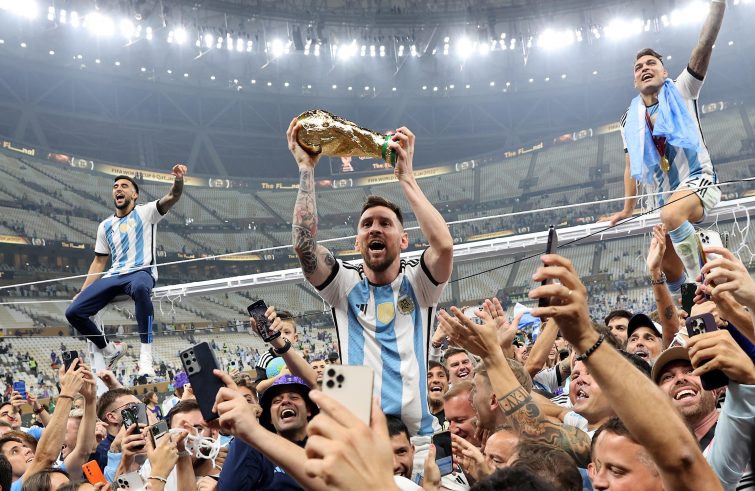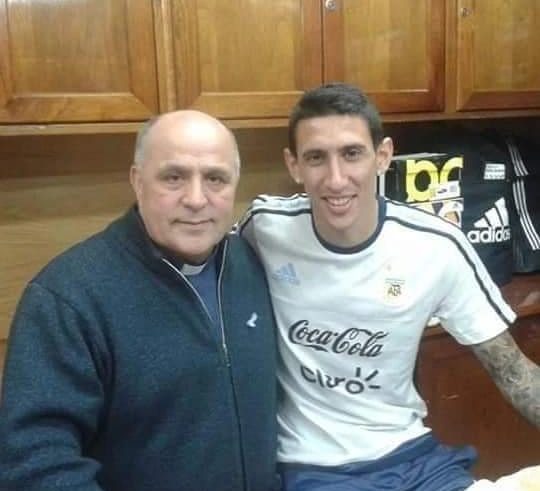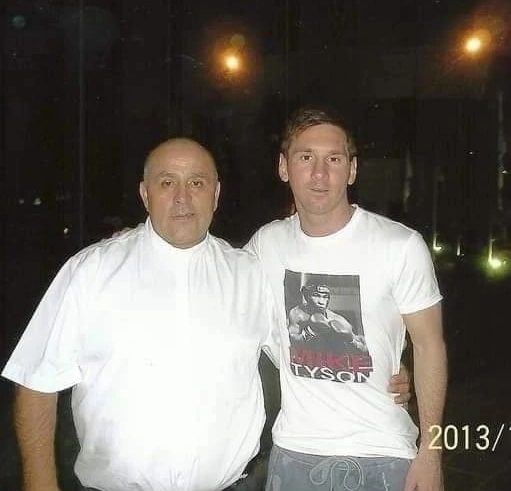
The world is Albiceleste. Thirty-six years after Maradona’s Argentina, Messi’s Argentina won the World Cup on penalty kicks against France, at the close of a splendid and exciting match, after the final ended 3-3 in extra time (Argentina led 2-0 at halftime and 3-2 in extra time) prior to the penalty shoot-out. It’s La Selección’s third World Cup victory, thus returning to Latin America after twenty years. Yesterday all of Argentina took a two-hour break and then flocked to the streets to celebrate. The critical economic and social situation of the country, where 43% of the population lives below the poverty line, was thus ignored, at least for a day. Huge crowds of people in Buenos Aires celebrated the long-awaited success. The new world champions stand as an example “that we must not be disheartened”, said the President of the Republic, Alberto Fernández.
Bishop Fernández: “It includes social values.” “On this occasion we saw that the players put aside their personal interests and projects and put their best foot forward for the team and to give us joy. Their strong unity was also evident, a genuine spirit of congeniality among the Argentine players”, Msgr. Víctor Manuel Fernández, Archbishop of La Plata, theologian and former Rector of the Catholic University of Argentina, told SIR. “Those values – he added – are related to achievement and send out messages for other areas of social life.” The archbishop shared his personal recollection of Lionel Messi, the hero of this World Cup: “I met him during a friendly match in Rome and during the team’s ensuing visit to the Pope. I don’t think he remembers me, although I was impressed by his simplicity and humility. I also heard him talk about his faith in God that – he says – gave him his special gift.”
The joy of the “chaplain” of Argentine football. Also Father Juan José Medina, chaplain of the Argentine Football Association (AFA) for the past 25 years, is celebrating in the Argentine capital, with his heart in Qatar. It is a form of “historical memory”, he says to SIR, still enthusiastic for what he had experienced a few minutes earlier: “It is indeed a great, overwhelming feeling of joy”, especially since some of the players are well known to the priest, including Lionel Messi: “I met him for the first time at the under-20 World Cup, in The Netherlands, in 2004. At that time he was a very polite and well-mannered young man, and surely no one at the time could have thought he would have such a career, crowned by today’s match.”
Father Medina is especially well acquainted with Ángel Di Maria, the team’s other “senior” top player: “I have a personal relationship with him, he is very devout, he also spoke to me about some family matters, over which he had asked my counsel.
There is less familiarity with the younger members of the team, with the exception of midfielder Alexis Mac Allister, an unexpected highlight of this World Cup: “He started from the bench and earned his way as first-string player. I also know his parents, who took care of his religious formation.” But Father Medina holds coach Lionel Scaloni, with whom he has a beautiful personal relationship, in the highest esteem: “He is a wonderful person, a very reliable man, who attends the parish of the seminary in Buenos Aires. He is very much aware of his responsibilities, which he carries out not only through his football expertise, but also through his cultural skills.” Now is the time to celebrate: “Crowds of people flocked to the streets, everyone is celebrating together, without differences. People are happy today, but we must not forget about Argentina’s major poverty and insecurity issues.”
- (Foto padre Juan José Medina)
- (Foto padre Juan José Medina)
The consequences for society and politics. What does this victory mean, or what can it mean for Argentine society? “The overwhelming enthusiasm of Argentinian fans, expressed with such passion throughout the entire country, deserves our attention”, says Monsignor Fernández. “Political and ideological differences slipped into the background for some time, and there was a common dream. This will most definitely not last, owing to the strong social divide existing in many countries today. But this respite proves one thing at least: those differences can be overcome when we share the same dream.” Agustín Salvia, professor of Sociology at the Catholic University of Argentina and coordinator of the Social Debt Observatory at the same university, contacted by SIR, provides a further insight into the social implications of this victory. He responds bluntly to the idea that this victory may pave the way for unhoped-for unity, overcoming political and social divisions. “Quite the contrary”, he says. “In fact, Argentina’s World Cup win, while certainly representing a major event, sheds light on a glaring and deep-rooted contradiction as regards the world of sport and politics. The national football team has worked well together, with a very straightforward, honest, and transparent head coach, capable of valuing human resources and creating a team in which there is no conflict, that engages in dialogue, and fights for the same cause, which is to win and ultimately to bring happiness. All of this is extremely valuable, but it signals an equally great inconsistency with the world of politics, considering not only the clashes between the major political forces, but also what happens internally, within the same political parties.
We are looking at a splintered, competitive political class battling each other instead of joining forces to develop a common project. This political class seeks to eliminate the adversary, negating their existence and their potential capabilities.”
In Salvia’s opinion, “for exactly this reason, no political party can claim credit for this success. If someone does, they will pay a price, and it could turn against them, it could be a boomerang, precisely because a clash with the national football team exposes politicians’ failure to live up to the current situation and its inherent challenges.” As regards the celebrations taking place at this time, “it is wrong to say that they represent a narcotic to divert attention from nationwide poverty. Celebrating is fine, but the best way to celebrate is to be inspired by the unity of Scaloni’s team, by the footballers who did give their all for the happiness of the entire nation. In short, we are confronted with yet a new challenge to politics, called to work for unity, for the common good and for the homeland.” Archbishop Fernández agrees: “I don’t consider this a narcotic. The people of Argentina are intelligent, not stupid. In any case, from this triumph they will draw the strength to fight and move forward.”














